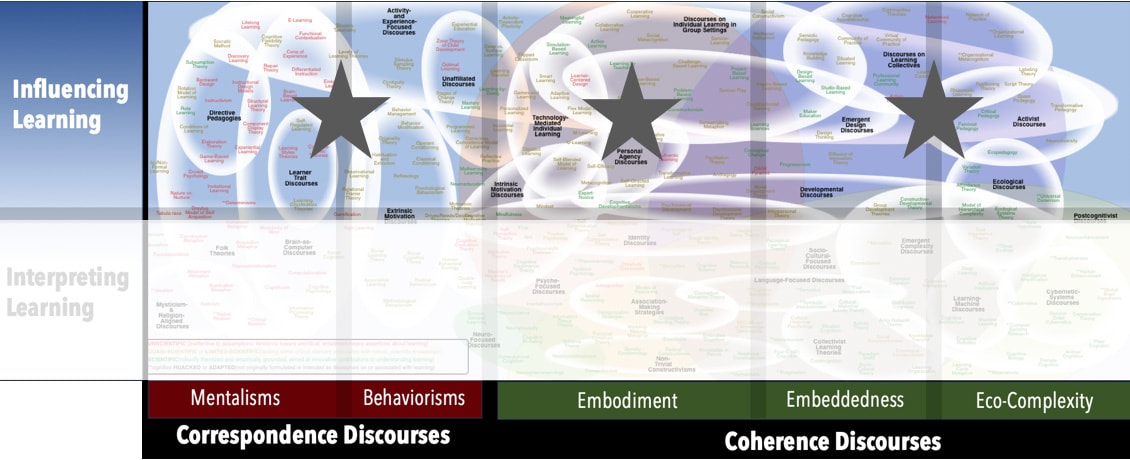AKA
Action-Based Learning
Activity-Based Learning
Activity-Based Teaching
Goal-Based Learning
Focus
Insisting that “doing” be part of the educational experiencePrincipal Metaphors
- Knowledge is … action-based and action-altering competencies
- Knowing is … applying; using
- Learner is … an actor; a doer
- Learning is … interpreting; developing abilities
- Teaching is … formatting (activities, challenges, and situations)
Originated
1900sSynopsis
Apart from those that might be described as “radical Mentalisms” (i.e., discourses that consider learning only in terms of transferring information into the learner), Activity- and Experience-Focused Discourses are common across virtually all modern conceptions of learning and teaching. That said, the rationales for activity and experience differ dramatically, with one extreme casting it as little more than opportunity to consolidate mental constructs through practice and illustration, and another extreme equating one’s action/doing with one’s learning/knowing. Associated discourses and constructs include:- Applied Learning – a diversely interpreted term that most often refers to approaches to formal learning that involve the direct application of concepts, theories, and/or skills in hands-on activities and in real-life situations. Applied Learning is sometimes treated as synonymous to such discourses as Service-Learning and Experiential Education, and it is invoked by many of the perspective included in the Activity- and Experience-Focused Discourses cluster.
- Effective Learning – a term that has been taken up by multiple educational movements – most often used in association and active- and experience based approaches (especially those that emphasis learner involvement and/or autonomy), and less often as a synonym for evidence-based practices
- Enactive Learning – learning within or through performance (Note: should not be confused with Enactivism)
- Experience-Based Learning – an oft-encountered phrase that is sometimes used to name specific theories, frequently mentioned as an important quality of formal learning settings, and that almost always points to advice to ensure learners’ prior experiences are incorporated into educational efforts
- Experientialism – a perspective on and model of formal education that focuses on experiences, based on the conviction that experience is needed to relate concepts and skills to one another while situating them in one’s existence
- Facilitation – derived from the French faciliter “to make easy,” Facilitation is a term that is commonly used to describe attitudes and approaches to teaching associated with Activity- and Experience-Focused Discourses. Specific interpretations vary considerably, from laissez-faire “stay out of the learner’s way” sensibilities to highly structured “deconstruct complex knowledge for learners” interventions. Most interpretations sit somewhere between, with recognized obligations to structure learning activities/experiences and to be available to assist the learner as required.
- Non-Learning – broadly speaking, any situation in which an agent misses an opportunity to learn about a matter that is relevant to that agent’s existence. More specific uses include: (1) at the individual level, events of learning that are partial or inaccurate, diminishing their utility; and (2) at the collective or organizational level, acts of ducking or diverting responsibility in ways that by-pass opportunities to adapt productively.
- Action Teaching (Scott L. Plous, 2000s) – a model of teaching that combines two commitments: (i) incorporating engaging activities into academic study and (ii) integrating societal issues
- Active Schools – an organization based in the United States that self-describes as a “movement” and an “approach” that advocates and provides supports for daily physical activity and well-developed physical-education experiences across grades
- Computational Literacy (various, 2010s) – the competencies and dispositions associated with effective and critical usage of computational technologies
- Computational Thinking (Seymour Papert, 1980s) – engaging with coding (i.e., computer programming) within a context of Problem Solving (see below). Typically, Computational Thinking is seen to require and support such skills as decomposition (i.e., analyzing a situation or pattern and parsing it into elements or steps) and recomposition (i.e., logically organizing information, typically into an algorithm).
- Laboratory Learning – learning located in a space that is designed for practice with, observation of, and/or experimentation on materials and phenomena. Such spaces can be physical (e.g., a research lab) or virtual (e.g., involving computer-simulations).
- Problem Solving – a phrase that is used to label many different emphases and practices within discussions of learning and teaching. Most commonly, Problem Solving refers to engagement with non-routine exercises, which is typically seen to support Deep Learning (see Deep vs. Surface Learning) through contextualizing subject matter while requiring learners to think divergently. Opinions vary dramatically over what constitutes good teaching practice around Problem Solving, but empirical evidence points toward precision (and/or opportunities to seek clarity), nuanced scaffolding, instruction in decomposing complicated scenarios, tight linkages to current topics of study, personal relevance, and appropriate social supports.
- Representational Learning (S.E. Ainsworth, 2000s) – engaging with a substitute of an actual phenomenon (e.g., a video of a riot, or a simulation of a geyser), rather than having direct experience
Commentary
Activity- and Experience-Focused Discourses are part of common sense in contemporary formal education. Few would argue against attending to them – and this superficial point of agreement across discourses masks yawning and debilitating divides in belief and practice.Subdiscourses:
- Action Teaching
- Active Schools
- Applied Learning
- Computational Literacy
- Computational Thinking
- Effective Learning
- Enactive Learning
- Experience-Based Learning
- Experientialism
- Facilitation
- Laboratory Learning
- Non-Learning
- Problem Solving
- Representational Learning
Map Location

Please cite this article as:
Davis, B., & Francis, K. (2024). “Activity- and Experience-Focused Discourses” in Discourses on Learning in Education. https://learningdiscourses.com.
⇦ Back to Map
⇦ Back to List
